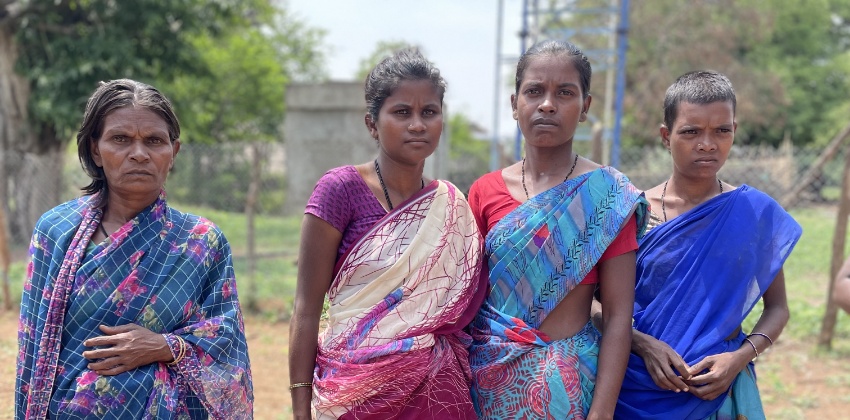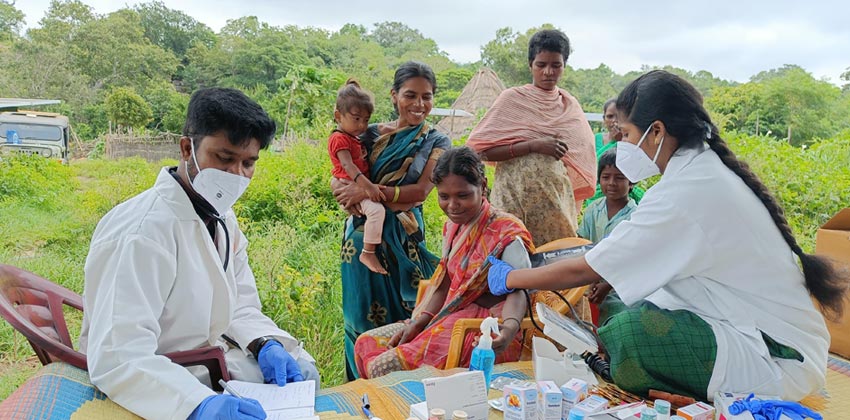A kaleidoscope of summer butterflies hovering above, and toddlers running below are the only signs of activity in Pullaiapallle. At noon, this penta (settlement) inside the Amrabad forest, Telangana, wears the look of a deserted town. Almost all of the 30 Chenchu families that reside here have either stepped into the forest to gather eetha pallu (wild dates) or are still asleep from last night’s drinking binge. The children bear witness.
“My grandfather drank a lot last night. He is probably sleeping somewhere. My grandmother has gone to find him and bring him back home,” says 5-year-old Savithri. Her friend Santhosh chips in brightly, “Mine too. And my father too.”
Addiction to alcohol is one of the biggest health issues among the Chenchus, a particularly vulnerable tribe residing in the Nallamala hills that span Telangana, Andhra Pradesh, and Odisha. An aboriginal tribe, the Chenchus are primarily hunters-gatherers living off the forest, who over the years have been forced to come out of the forest and take up manual labour jobs in agriculture and construction.
This is mostly because the forests aren’t always that bountiful, but also because successive governments’ understanding of forest protection is to shift the people out. The Chenchus themselves are caught between an older world of relative seclusion in the forest and a newer, shinier world filled with plastic baubles, outside.
While malnutrition and anaemia are huge concerns for the Chenchus, just as big is the community’s addiction to alcohol. More Chenchu tribespeople die of liver cirrhosis than any other age-related illness. A 2015 study published in the Indian Journal of Medical Research, assessing the diet and nutrition profile of the Chenchu population, attributed 20% of deaths to alcoholic cirrhosis of the liver, followed by old-age, suicides, snake bites, and accidents.
The study’s findings corroborate what Total Health’s ground workers observed in their 2020 survey: in many pentas and gudems (villages), it is unusual to see a healthy man in his 60s.
In the nearby Appapur penta, M Lingayya says, “Our work involves so much physical labour, it is bone-tiring.”
For about 15-20 days in a month, the Chenchus of Amrabad rely on ‘coolie’ daily wage jobs that pay them Rs 250 a day. Depending on the season, they also set out to gather honey, roots like chenchu gadda and pala gadda, the madipaku leaf, and other forest produce, which requires them to walk about 15 km uphill and downhill, amongst the trees, over stones.
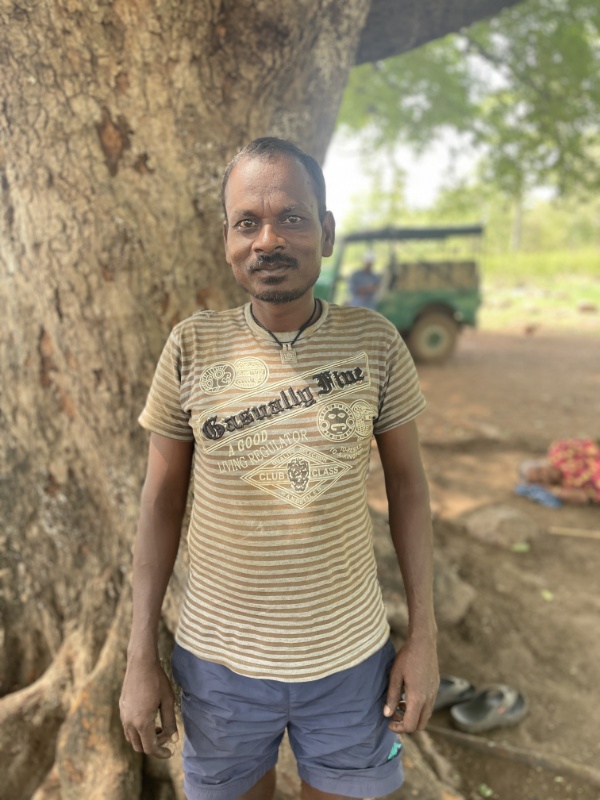
Adds Lingayya, “So when we finally get our pay, drinking is a good release for that stress. I’d say most of the men here spend almost all their money on alcohol. If you earn Rs 5,000 a month, a minimum of Rs 3,000 will be used for drink.”
Dr Bharath Kumar, who has worked at Apollo Foundation Total Health’s clinic in Mannanur and still provides teleconsultation when required, says, “On an average, for every 10 people, 7 will have issues with alcohol addiction in this area. The biggest problem for the Chenchu tribe is actually malnutrition, and the amount of alcohol intake is directly linked to nutrition deficiency, apart from liver cirrhosis and heart failure.”
The lure of the ippa
Traditionally, alcohol wasn’t bought, but was made by the Chenchus. The ippa puvu (mahua flower) that blooms in the summer, is plucked and soaked in water with jaggery for 9 days. This solution is heated, the vapour passed through a bamboo pipe, and the condense collected. This is how ippa saaru (the local liquor of the same name) is made.
About 1 kg of the ippa condense will give you 1 beer bottle’s worth of alcohol (750 ml). “That is in the pure form. It can be diluted to give 5 bottles of ippa saaru,” says Lingayya. He also knows how to check for the purity of the saaru: “On burning, if it gives a blue flame, it means it’s of the best quality.”
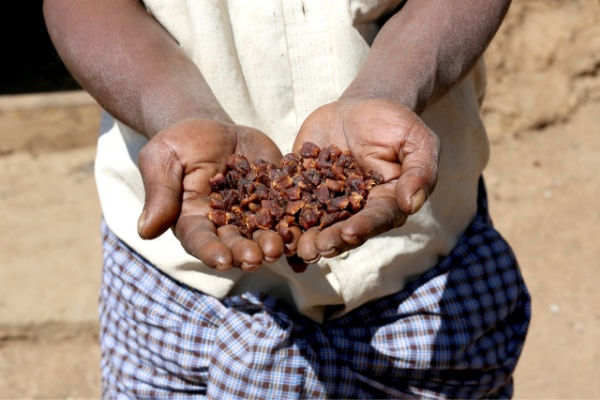
Traditionally had to heal a persistent cough, ippa saaru can be made only seasonally. However, with access to liquor stores outside the forest becoming easier, alcohol is no longer a seasonal drink saved up for special occasions.
Outside Andhra’s Nagarjunsagar Srisailam Tiger Reserve, at the Thirumalagiri Chenchu colony, all of the families moved out of the forest 30 years ago. Almost everyone here drinks on the regular, and this is one of the risk factors for people getting tuberculosis as early as in their 20s.
For Chenchu children, their first taste of alcohol is as early as 10 to 12 years old, after discovering bottles near their parents, who may be lying passed out.
Dr Suresh Babu, who works at a PHC in Vatavarlapalle, 20 km from Amrabad says, “Alcoholaddiction starts in children as young as 16 years of age. Over 60% of the people I see have alcohol addiction. However, we know this only by talking to them. We don’t have the tools to test for liver cirrhosis. For that, people have to go to bigger hospitals.”
For the past 3 years, once every 15 days, Dr Babu has been visiting 9 pentas under his care. Belonging to the Lambada community and having grown up 60 km from here, he is happy to be posted in an area where he can serve other tribal communities. “In my experience, most Chenchu men and women get access to drinks when they come out of the forest to sell what they have gathered,” he says.
Tirupatamma, who moved to the Thirumalagiri Chenchu colony in NSTR as a child agrees: “The drinking increases once we are forced to move out of the forest for livelihood and so-called development. See, inside, if you want to drink, you have to make it, that too in the correct season. It isn’t available easily whenever you want.”
In Amrabad, the Chenchus of Appapur add that when buying alcohol such as whisky and beer might be too expensive, they resort to the ‘Lambad tanda’ – a name given to the palm toddy prepared by the Lambada community.
“The price for that increases based on demand, but such is the addiction among our men that they will dip into our savings as well,” says Jaya Laxmi, an Appapur resident in her 50s. “It’s got to the point that the people selling the liquor outside are getting richer and richer off us, while we are pushed further down into the debt trap.”
Where will the money come from?
While it is the back-breaking work that is held as the reason for drinking, holding down that job becomes difficult for those addicted. Take for instance, K Balaya, was working as a driver in the base camp at Bairapur. Three months ago, he missed work for 2 days as he was incapacitated by an alcohol binge. Unfortunately for him, it was in those 2 days that higher authorities from the government came for an inspection, and Balaya lost his job. His wife, K Ankamma narrates this story.
“For months after that, it was me who ran from pillar to post trying to get his job back. We have 5 children to feed. Sure, give him a scare; that will make him stop drinking for a while, but don’t sack him completely. What will happen to us, his family now?” she asks.
Like with every type of addiction, here too, the family suffers. The women of Amrabad drink too – however, in lesser numbers. With their husbands drinking, it falls on the women to focus on their family’s social and financial security.
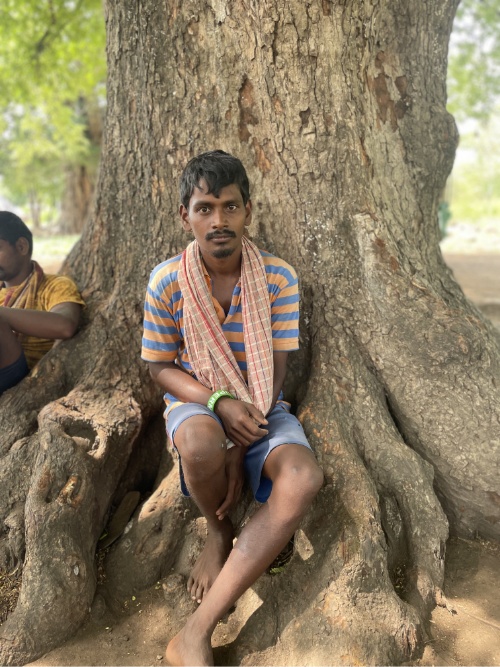
“Their health might deteriorate because of alcohol, but ours does too, running after them, making sure they are eating properly. And then all the stress about where the money will come from,” says Jaya Laxmi. Under the influence, domestic fights break out frequently, with almost all the women of the penta agreeing that they have faced occasional violence in their homes. “They hit us after drinking, and we hit them back,” she says.
Sometimes, the money spent on drinking even cuts into the money saved for buying food. A particularly frustrated resident of Thirumalagiri colony, M Ankamma says, “A person who wants to drink will buy it. It doesn’t matter if he goes hungry or his wife does. There is no solution to this; they will drink until the day they die.”
The strength to quit
Despite her bleak outlook, in Appapur, winds of change are already blowing. For 3 months now, 26-year-old T Guruvaiyya has not touched a single drop of alcohol. His reason for giving up? “I want to move ahead in life, I want a better future for my family.”
Not only does Guruvaiyya feel healthier and fights with his wife having reduced, he also notes something else that makes him even happier: “My kids would earlier be scared of coming to me. But now I get to spend so much more time with them.”
As B Lakshmi, wife of the village head says, “It is easier to quit drinking when you have an eye on your long-term goal.” For 15-year-old T Mallikarjun that long term goal is sport.
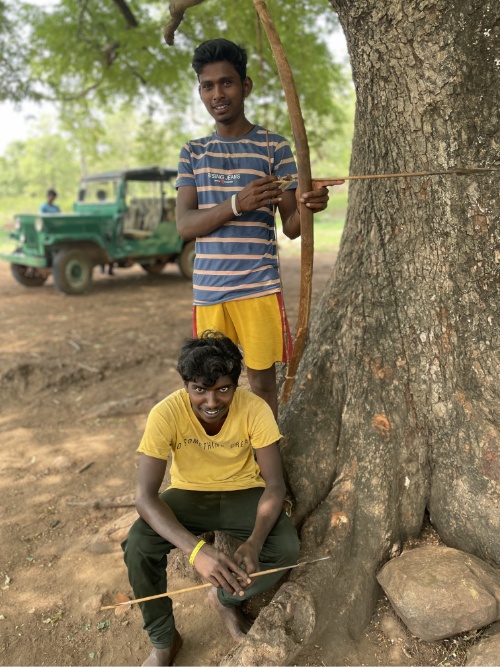
The Chenchu teenager is already an expert at archery, having learnt from his father since he was a child – the traditional knowledge of a bow and arrow is passed down each generation even though they no longer hunt for sustenance. Mallikarjun proudly reveals that he has been sent to Hyderabad for training on a sports quota for tribals. “I have seen what alcohol has done to my elders, so I don’t want to fall into those ways,” he says.
